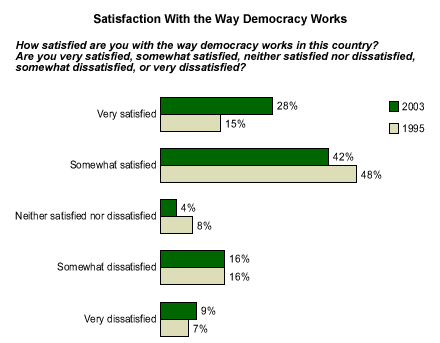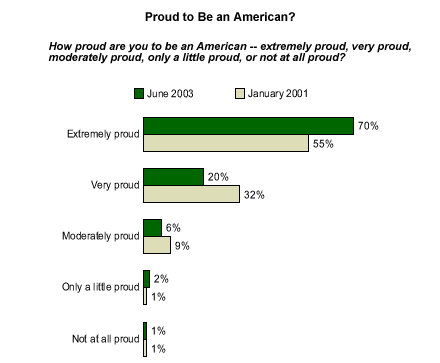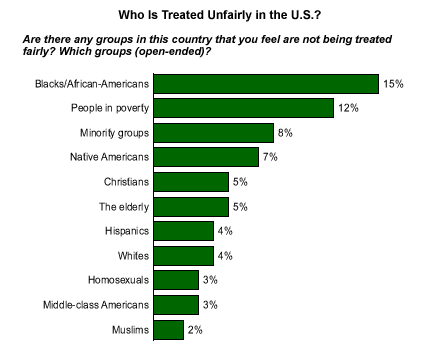Second article in a three-part series
Are Americans satisfied or dissatisfied with the way democracy works in the United States? What do they think it means to be American? These vital questions must be asked in a free society if the government is indeed to be "of the people, by the people, and for the people."
Periodically, The Gallup Poll takes such soundings of the health of democracy. According to a survey conducted in August and September 2003*, a solid majority of Americans (70%) are satisfied with the way democracy works in this country, with 28% saying "very" satisfied and 42% saying "somewhat" satisfied. These figures represent a distinct improvement over findings from a 1995 Gallup Poll, which showed 15% of Americans very satisfied and 48% somewhat satisfied. However, the percentage expressing dissatisfaction has changed little between 1995 and 2003 -- in both years, about one in four Americans said they were either somewhat or very dissatisfied with the way democracy works in America.

A breakdown of the responses to this question by political party shows that people who identify themselves as Democrats and independents are less satisfied with the way democracy works than those who identify themselves as Republicans are. However, while only 12% of Republicans are dissatisfied with the way democracy works in the United States, 34% of independents and 33% of Democrats hold that view. This very well could be an outgrowth of the fact that a Republican president currently occupies the White House.
Proud to Be an American?
Another recent Gallup Poll** showed that 70% of U.S. adults are "extremely proud" to be American, up sharply from 55% who gave this response in January 2001, several months before the terrorist attacks in September.

Are All Men Created Equal?
As outlined in the Declaration of Independence, one of the basic premises of a democracy is that all citizens have equal rights ("all men are created equal"). Are Americans confident that this premise is actually played out in our society?
According to this August to September poll, nearly half (47%) of respondents said there are groups in this country that are not being treated fairly, and 51% said there aren't any groups not being treated fairly. When asked to name which groups are not being treated fairly, Americans most often mentioned blacks, people in poverty, minority groups, and Native Americans.

Bottom Line
The Sept. 11 terrorist attacks seem to have had a lasting effect on Americans' views of what it means to be American. More Americans today than before the attacks are satisfied with the way democracy works in the United States, and more say they are proud to be American. It will be interesting to see whether levels of satisfaction and pride persist over the long term -- that is, whether the attacks had a fundamental effect on Americans' views toward patriotism and democracy.
*Results are based on telephone interviews with 1,008 national adults, aged 18 and older, conducted Aug. 28 through Sept. 15, 2003. For results based on the total sample of national adults, one can say with 95% confidence that the margin of sampling error is ±3 percentage points. In addition to sampling error, question wording and practical difficulties in conducting surveys can introduce error or bias into the findings of public opinion polls.
**Results are based on telephone interviews with 1,003 national adults, aged 18 and older, conducted June 27-29, 2003. For results based on the total sample of national adults, one can say with 95% confidence that the margin of sampling error is ±3 percentage points.
